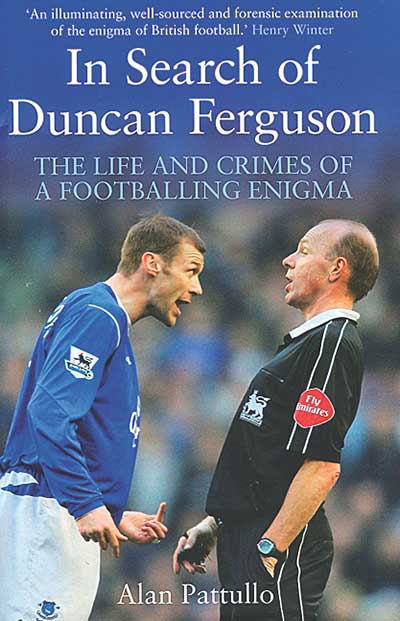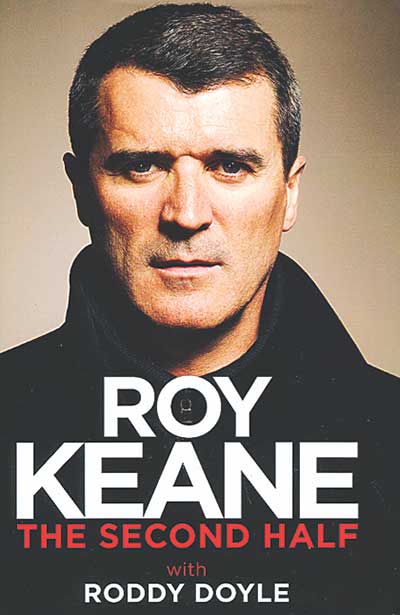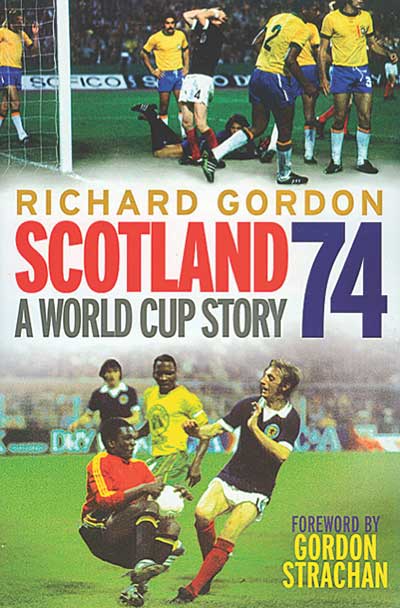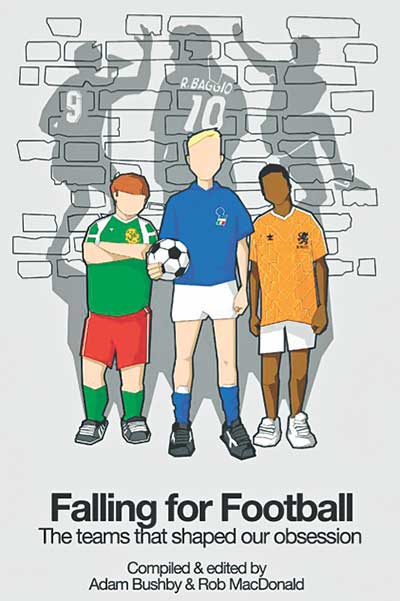{youtube}RqkOx1S3zbI{/youtube}
Search: ' Port Vale'
Stories
 The life and crimes of
a footballing enigma
The life and crimes of
a footballing enigma
by Alan Pattullo
Mainstream, £18.99
Reviewed by Archie MacGregor
From WSC 336 February 2015
For someone who so determinedly shunned the media throughout his playing career Duncan Ferguson had quite a knack for grabbing headlines. The two were intrinsically related of course and contributed to him polarising opinion like few other Scots-born players have in recent decades, with perhaps only Graeme Souness ahead in the queue. This book lays bare not only justifications for his brooding hostility towards the press pack but also in turn how such unwillingness to explain himself fuelled antipathy towards him, especially in Scotland.
For those with strongly held opinions over whether Ferguson was a chronic underachiever with delinquent tendencies or a mixed-up kid who just needed to feel appreciated it’s unlikely this thoughtful and even-handed appraisal by Alan Pattullo will persuade them to change camps. Among the undecided there is simply just a lot more to ruminate over.
On the playing side the book chronicles Ferguson’s emergence as an exciting prospect at Dundee United, a then record-breaking £4 million transfer fee when he moved to Rangers in 1993, his failure there and the headbutt on Raith Rovers’ Jock McStay that led to a short jail sentence, a smattering of generally underwhelming international appearances and finally rejuvenation of sorts, eight sendings-off and near folk-hero status in two spells at Everton. Off the field Ferguson also emerges as no less paradoxical. For every interviewee testifying that he was “fun”, “sensitive” or had “a heart of gold” there is another portraying him as a “hellraiser”, “cruel” or “difficult to like”.
It’s hard not to escape the view that Ferguson’s early experiences under the successful but authoritarian Jim McLean at Tannadice shaped his seemingly ambivalent attitude towards the game. Along with notoriously long contracts to tie players down, there were results-driven pay packages with low basic wages topped up with relatively handsome appearance and win bonuses. This bred a “brutal” culture within the club where players competed ferociously with one another to make sure they were in the matchday squads. Newcomers were treated as unwelcome potential rivals and details of how Ferguson once humiliated a young German trialist by cutting up his suit in the dressing room make for particularly uncomfortable reading.
His penchant for getting into trouble ultimately led to a spell in Barlinnie prison. This was viewed as harsh by some but three previous convictions for assault prior to the McStay incident hardly stood him in good stead in court. However no one in the book offers any support for the SFA also seeking to impose a 12-game ban as its own punishment – a move that wholly soured Ferguson’s relations with the Association and all but extinguished his desire to play for Scotland.
It was letters of support from Everton fans, including one from a young Wayne Rooney, that Ferguson credits with keeping him going through those dark days and helped forge the strong relationship he has with the club to this day. Pattullo, like others who have taken a keen interest in his tumultuous career, could barely imagine him ever becoming a coach but there he is, an integral part of Roberto Martínez’s back-up team at Goodison Park. Heavens he’s even started speaking to the press occasionally. Maybe the autobiography will be next.
 My autobiography
My autobiography
by Roy Keane and Roddy Doyle
W&N, £20
Reviewed by Dave Hannigan
From WSC 335 January 2015
Near the very end of this book, Roy Keane fondly remembers a night at Nottingham Forest when Brian Clough gifted him a £50 note for accompanying him to a charity event. For a 19-year-old neophyte in 1990, that was a substantial sum and the memory stuck with him. Yet, earlier in the narrative, he talks about telling his family they would all have to cut back after he departed Manchester United, by which time his personal fortune was, according to Sunday newspaper rich lists, well north of £20 million.
That sort of inconsistency is rife in these pages, as rife it would seem as it is in Keane’s personality. He hates publicity and craves anonymity yet for the past decade of his life, he has spoken out so often about so many topics that he’s the footballing equivalent of singer/shock merchant Sinead O’Connor. He’s livid at Alex Ferguson for criticising players and being disloyal but, as he trawls through his own managerial stints at Sunderland and Ipswich, he sticks the boot into those who he believes let him down.
If those sort of double-standards are infuriating, this is still a very entertaining account of the subject’s life since the publication of his first autobiography in 2002. Keane is forthright about most (crucially not all) subjects and, as fans of his fast-paced fiction will already know, ghostwriter Roddy Doyle has a wonderful light, comic touch. His handling ensures that this fairly crackles along while offering glimpses of life behind the scenes at Old Trafford, the Stadium of Light and Portman Road.
For all that though there’s something terribly dissatisfying here. Firstly, all the best gags lose their impact because you’ve already read them somewhere else. Secondly, several times you think Keane is finally going to open up about the demons that drive and torment him. Yet he doesn’t. Drink is discussed more than once but by the end of the book you are no nearer understanding the exact nature of his troubled relationship with alcohol.
Strangely for a memoir, he also swerves away from discussing his family. That may be his prerogative but when he makes references to the adverse impact of controversies on his wife and kids, you expect a little more substance about that side of his life. Surely, the very purpose of a serious autobiography is to show the man behind the lazy tabloid caricature.
Even if it is getting tiresome, Keane is still to be commended for having the guts to rail about Ferguson, the game’s most sacred sacred cow. Yet Irish readers in particular will be disappointed he hasn’t a single thing, positive or negative, to say about John Delaney, chief executive of the FAI, and beyond Keane himself, the most controversial figure in the sport in Ireland. Did the current Ireland assistant-manager pull his punches? Or is he learning to be smart when it comes to staying gainfully employed? Like so much else in this book, there remain more questions than answers.
 A World Cup story
A World Cup story
by Richard Gordon
Black and White, £11.99
Reviewed by Archie MacGregor
From WSC 332 October 2014
With yet another World Cup having passed Scotland by, the fondness and esteem with which the squad led by Willie Ormond to the finals in West Germany all of 40 years ago are regarded seems to grow ever warmer. Not without some justification either, as although they were unable to progress beyond a group featuring holders Brazil, Yugoslavia and Zaire, they emerged unbeaten, something not even West Germany as eventual winners could lay claim to. Nothing captured this particular glorious failure more enduringly than the image of Billy Bremner clutching his head in his hands as he came within a bobbled ricochet of earning the Scots what would have been a dream-like, yet arguably deserved, victory over the Brazilians.
As nostalgia trips go it makes for an engaging story and Richard Gordon, the respected voice of BBC Radio Scotland’s football coverage for many years, covers it in sure-footed and enjoyable fashion, relying heavily on a mix of interviews with surviving members of Ormond’s 22-man squad and contemporary press coverage. Perhaps the most remarkable aspect of the entire 1974 campaign from qualification to its agonising denouement in the final match against Yugoslavia is just how shambolic Scotland’s preparations had been on and off the field. While it was nothing compared the apocalyptic meltdown that was to come along four years later under Ally MacLeod in Argentina, this Scottish side and their entourage pretty much lived up to something of a Spinal Tap equivalent of the worst stereotypical behaviour of footballers on tour.
Most notorious was the Jimmy Johnstone “lost at sea” rowing boat incident at the squad’s Largs training base for the Home Internationals. But this was just one ill-starred tale among many of broken curfews, boozing, disputes over commercial deals and rumours of team selections being not solely the preserve of the manager. Ironically it was probably Johnstone who had more reason than anyone to emerge with a sense of grievance from the maelstrom, as having apparently been forgiven by Ormond for his boating misdemeanour and yet another breach of discipline prior to a warm-up game in Oslo, he did not feature in any of the three group matches despite still being near the peak of his powers.
While saluting Scotland’s valiant playing endeavours the theme of self-destruction just keeps on recurring. Depending on who you believe, the players either had a misplaced sense that victory alone over Zaire in the opening game was sufficient or they wanted to conserve their energy for the big one against Brazil. Either way it never looked like being enough, but there was to be a final unkind twist as their fate was sealed by an unfortunate fumble by Zairian goalkeeper Robert Kazadi which gifted the Brazilians a decisive third goal in the final round of group matches.
As the book reminds us there was however to be one lasting consolation for the players – uniquely among all of Scotland’s squads to have participated in a World Cup finals they actually got a welcoming party when they arrived back at Glasgow airport.
 The teams that shaped our obsession
The teams that shaped our obsession
edited by Rob Macdonald and Adam Bushby
Ockley Books, £11.99
Reviewed by Pete Green
From WSC 331 September 2014
My Favourite Year, the 1993 anthology co-published by WSC and edited by Nick Hornby, celebrated like never before the obscure, personal details of how supporters become smitten. Superficially Falling for Football seems little more than an equivalent for the Twitter generation, those for whom Chris Waddle and inflatable bananas represent earliest memories. The bloggers deserve a wider audience, though, and talented writers and editors such as Rob Langham (The Two Unfortunates) and Ian King (Twohundredpercent) have forced complacent broadsheets to up their game.
A great strength of this new volume is its broader scope in both the teams and the backgrounds of their fans. It is a delight to witness Ash Hashim falling for Spain in 2002 – reassured about their World Cup prospects by her Welsh grandfather, while her Arabic mother cheers for South Korea – and then share in Glen Wilson’s memories of Rossington FC, the pit village club where his dad was manager, groundsman, secretary, coach, programme editor and substitute.
It’s intriguing, too, how the two distinct approaches to English fandom articulated here seem to analogise with social class. Broadly speaking it’s the working-class fan who adopts their parents’ club, while the neophyte who selects from a field is often freed up to do so by their roots in a white-collar family where no one likes football. The latter is embodied here by Alex Douglas – a Red unconnected to Manchester, who arrived with United via Sheffield Wednesday and Paris Saint-Germain – and his unintentionally hilarious question “Whom would I support?” Readers must decide for themselves whether it’s the sense of choice and entitlement or the painfully correct pronoun declension that makes this towering middle-class quandary such a hoot.
The quality of writing is variable, too, but the more capable authors find ways to avoid cliche. Daniel Grey pitches a curveball by focusing on the famous but fictitious Barnstoneworth United of Ripping Yarns infamy. We can assume that Stefano Gulizia’s academic treatise on Juventus and the naming of colours is a sort of intellectual joke (it quotes Jacques Derrida), but it contrives to enrich the volume while being entirely unreadable.
In the hands of the weaker writers, the short, blogpost-style chapters can become formulaic, sometimes wearyingly so. But there’s an authenticity about the ungainly prose here which some will find more satisfying than the slicker stuff, and older readers will be reassured to find resilience and continuity in the symbolic power of Bovril. Falling For Football finds new angles on football’s oldest story, and the good outweighs the bad. You’ll probably know someone who’s experienced a football epiphany during this year’s World Cup. Buy them this and they’ll know they’re not alone